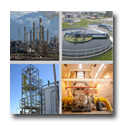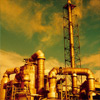The Contact Process features the passing of a mixture of sulphur diaoxide over a catalyst and passing the resultant sulphur trioxide into concentrated sulphuric acid.
Sulphuric acid is a strong dibasic acid, with properties of an oxidising and dehydrating agent.
Its dehydrating properties are important in absobing water formed in such chemical processes as in nitration i, esterification processes and saponification in the soap and detergent manufacture.
Sulphuric acid is sold in varying stengths or percentage of SO3 (sulphur trioxide) in H2SO4.
The latter known as Oleums,
The commercially available strengths of sulphuric acid are as follows:
Strengths of Sulphuric Acid
|
Specific Gravity
|
% Sulphuric Acid
|
Battery Acid
|
1.250
|
33.3% |
Fertiliser acid
|
1.525 |
62.2% |
Oil of Vitriol
|
1.835 |
93.0% |
Concentrated Oil Of Vitriol
|
1.841 |
98.0% |
100% Sulphuric acid
|
1.835 |
100.0% |
20% Oleum
|
1.915 |
105.0% |
60% Oleum
|
1.992 |
114.7% |
With its wide range of chemical properties the controlling of the various forms of sulphuric acid makes it
extreemly important that the correct material of construction for valve / pump is used.
In higher concentrations valves and pumps are often manufactured in plain cast iron or ductile iron
The chemical resistance of these materials is basically due to the fact that they contain a high content of
combined carbon and a low content of free graphite.
The acceptable corrosion rates must be determined by the Corrosion Engineer since these vary with increase velocity of the acid.
Corrosion Rates for Grey cast Iron
Temperature |
% H2S04
|
mm per year |
Ambient
|
65-98 |
<0.20 |
80 deg C
|
70-98 |
0.20 - 1.5 |
100 deg C
|
96-98v |
0.5 - 1.5 |
Corrosion Rates for Ductile (Nodular / SG) cast Iron
Temperature |
% H2S04
|
mm per year |
Ambient
|
85% |
0.40 |
50 deg C
|
85% |
1.03 |
100 deg C
|
98% |
0.28 |
It can clearly be seen that above a percentage of approximately 85% the corrosion rates start to fall which
allows the use of cast irons as a favourable material for the construction of valves and pumps.
The one factor NOT taken into account in the above example is the effect of velocity which is considerable when considering the the choice of materials to handle sulphuric acid.
This adverse effect is known as errosion corrosion .
In its more dilute forms there are many polymers and inert linings that will offer the engineer a economical choice in the controlling of sulphuric acid.
Diaval Diaphragm valves, with its many linings and smooth flow characteristics has been the Corrosion
Engineers and Plant Managers first choice for handling and controlling sulphuric acid on the grounds of
economics, safety, easy of maintenance and availability.
The following graph give a general indication of material choice available for Diaval Diaphragm valves.
For final selection of contact Diavals Corossion Chemist who will be able to advise the most suitable choice based on operating parameters. |





